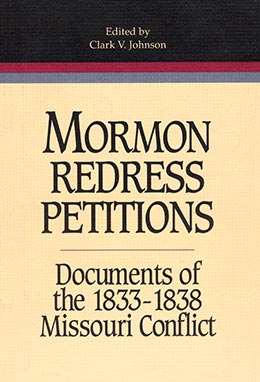Introduction to Part VI
Introduction to Part VI in Mormon Redress Petitions: Documents of the 1833–1838 Missouri Conflict, ed. Clark V. Johnson (Provo, Utah: Religious Studies Center, Brigham Young University, 1992), 727–728.
Part VI is comprised of miscellaneous documents which are found among the petitions in the National Archives or the LDS Historical Department.
Item one is a letter that was printed in the Latter Day Saints’ Messenger and Advocate Extra. It was addressed to nine men in Clay County, Missouri, thanking them for their help in trying to mediate the differences between the Saints and the citizens of Clay County. The article also attempts to discount many of the accusations that had been made against the Mormons who were then living in Missouri.
The second document is an incomplete letter written to Colonel Price. Presumably, this is Colonel Sterling Price, who opposed the Mormons and served in the state militia that effected the surrender of Far West in 1838. This document tries to give perspective to the events at the Gallatin election by describing the political tension tension that led to the riot on election day.
The third document, written by Sidney Rigdon, is a letter to Felix Grundy, Attorney General for President Martin Van Buren. Rigdon wrote for advice on how the Saints might obtain recourse for the wrongs they had suffered. He must have written the letter while confined to prison in Liberty, Missouri, since it is dated 23 February 1839.
The next document is a letter Anson Call wrote to Sidney Rigdon. It is essentially a petition and even includes a bill of damages. However, it has been placed in this chapter since it is in letter format and was not sworn to before a county official.
Items five and six are endorsements signed by Church leaders recommending Joseph Smith. The first sustains him as presiding elder of the Church, and the second authorizes him to manage and transact all business for the Church before Congress and the President of the United States.
Next is a letter from Edward Partridge to Joseph Smith and Elias Higbee, who were then in Washington, D.C., detailing the land that Partridge lost in Jackson County.
The eighth document is a letter from Robert Lucas, governor of Iowa Territory, to A. Riply, who had asked Lucas for a statement of his opinion of the Mormons-Lucas replied that the Mormons were good citizens. This letter was presumably going to be used in the Church’s appeal to Congress for remuneration.
The ninth document, a letter from four citizens of Pittsfield to Illinois Senator Richard M. Young, is a letter of reference for the whole Mormon society. It expresses support for the Mormons’ attempts to gain redress, and requests Young’s help in this cause.
Document ten is a list of landholdings signed by Joseph Smith, Sidney Rigdon, and Elias Higbee. They certify that they hold land duplicates for lands that were purchased in Missouri by members of the Church.
The eleventh and twelfth documents are much like petitions, but are actually letters to Willard Richards, the Nauvoo Historian. Richards was collecting information regarding the Saints’ experiences in Missouri. The eleventh document is written by Isaac Higbee; the twelfth is probably written by Levi Hancock.
Documents thirteen through sixteen are accounts written by William Bowman, John Brassfield, and Adam Black concerning conversations they had with James B. Turner. It is ironic that these documents are filed with the petitions in the National Archives, for all four men were enemies of the Saints. In addition to these four accounts there is a remnant of a similar fifth account, not included because it is so fragmentary that it is almost meaningless. These documents probably were submitted to Congress as part of an 1841 Missouri response to the Mormon accusations.
The final documents are the permits to travel. After the Saints had surrendered to the Missouri State Militia, they were told to leave the state. However, they were apparently under the duress of obtaining permission from militia officers to travel. Several petitioners mentioned receiving permits to travel, and four included a copy of their permits with their petitions. Included here are passes for Nathan Baldwin, Alvin Hor, David Lewis, and Eliphaz Marsh.
